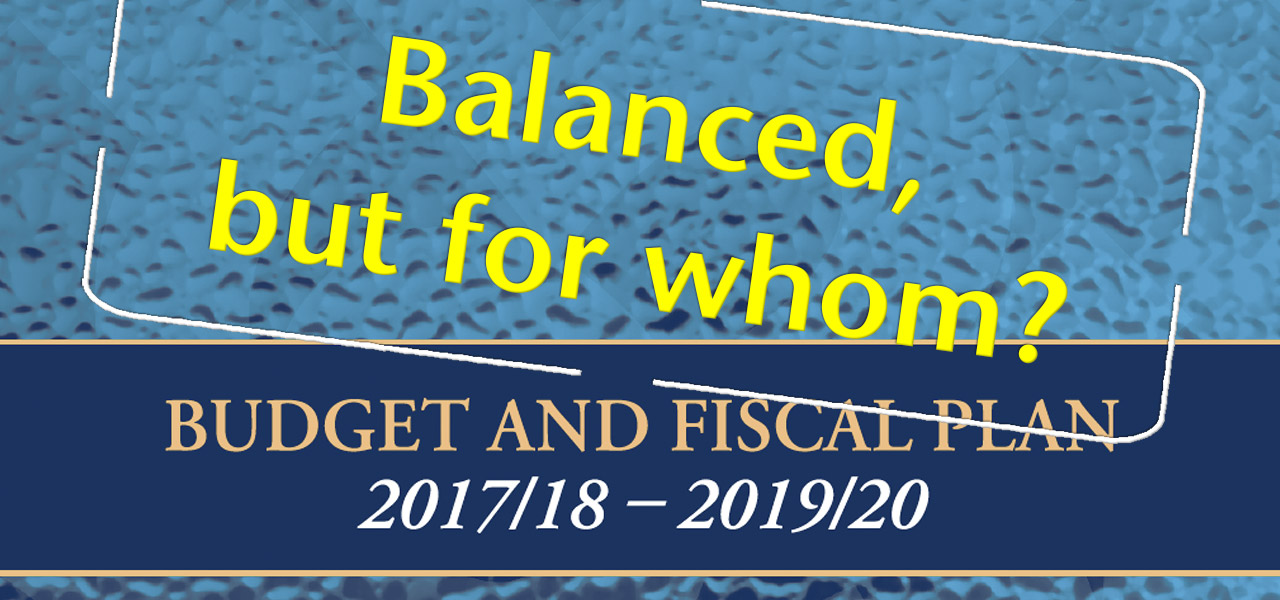Our recommendations for the 2017 BC Budget
On September 22, we presented CCPA-BC research and recommendations for BC’s 2017 Budget at a public hearing as part of BC’s 2017 budget consultation process. Here’s what we told the Committee.
At first glance, BC appears somewhat isolated from the economic challenges facing the rest of Canada. Headline economic indicators like GDP growth and job creation are posting strong increases. However, a closer look at our recent economic performance suggests that BC’s growth is imbalanced and fundamentally unsustainable.
The first worrying sign is that much of the economic growth over the last year was driven by real estate and retail sales, both of which are partly financed by foreign money and partly by an expansion of household debt. BC’s consumer debt continues to rise faster than our incomes, and BC households remain the most indebted in the country.
The real estate sector alone accounted for 30 per cent of BC’s GDP growth in 2015. The flip side of this growth is rising housing unaffordability with all of its negative social and economic consequences.
BC’s consumer debt continues to rise faster than our incomes, and BC households remain the most indebted in the country.
Despite historically low interest rates, which the Bank of Canada maintains in an attempt to spur business investment and boost the economy, business investment in BC remains weak. Statistics Canada data show that BC businesses intend to reduce capital investment (in construction, machinery and equipment) by 4 per cent this year after a 2 per cent decline last year. This doesn’t bode well for future growth in the province as household borrowing is not a sustainable economic driver, and private sector forecasters project a return to a more-modest economic growth rate for BC next year at 2.4 per cent following a 2.9 per cent projection for 2016.
Another worrying sign is that despite strong economic growth and job creation, prosperity has not been broadly shared. For example, BC’s economy is creating a lot of jobs but virtually all of them are located in Metro Vancouver and Greater Victoria. Other regions in the province lost jobs this year and have yet to recover the jobs lost in the recession seven years ago. In addition, many of the new jobs are part-time, temporary or low paid. Statistics Canada’s Job Vacancy and Wage Survey shows that among the ten occupations with the most job vacancies in BC in the first quarter of 2016, five paid less than $12/hour. These are not family-supporting wages.
So having a job in BC is no longer a guaranteed path out of poverty. One of nine British Columbians who used food banks last year was working but not earning enough to afford groceries. The recent CCPA-BC study Working Poverty in Metro Vancouver found that over 100,000 working-age adults in Metro Vancouver alone are working but still stuck in poverty, and this does not include students or youth living at home with their parents.
Despite strong economic growth, poverty remains a serious problem in this province. One in five BC children lives in poverty as does one in three single senior women.
Housing unaffordability is at crisis levels, especially in Metro Vancouver and Victoria where most jobs are located and where most British Columbians live. The shortage of child care spaces and the exorbitant fees for those that are available — which can run higher than university tuition — compound the affordability crisis for BC families and make it very difficult for many women to return to the workforce after having a child.
Our public schools are overstretched and particularly lack the resources to support children with learning disabilities and other special needs.
This isn’t what a strong sustainable economy looks like. Therefore, the CCPA-BC recommends that BC’s 2017 Budget should prioritize measures to rebalance the provincial economy, ensure that growth is socially and environmentally sustainable, and that it is broadly shared with all British Columbians.
Having a job in BC is no longer a guaranteed path out of poverty.
BC is in a great fiscal position to make strategic public investments given the record low costs of government borrowing and strong revenue projections tabled in the Ministry of Finance First Quarterly Report.
In that report, the Minister of Finance signalled that despite our excellent credit rating and very manageable debt level, the BC government plans to use a large chunk of its newly anticipated surplus to pay down debt faster than scheduled in last year’s budget. We advise against this. Resources for debt reduction would be resources not available to help children growing up in poverty, youth struggling with mental illness or frail seniors stuck in a hospital bed longer than medically necessary simply because there’s nowhere else for them to go.
In order to tackle the pressing problems we face, CCPA-BC has identified seven priority action areas for the budget.
- The $10-a-Day Child Care Plan: Budget 2017 should invest in implementing this plan as a large body of research shows the early years are critically important for brain development, good health, and lifelong learning. Yet, too few BC children have the opportunity to participate in high-quality programs because of long wait lists and high fees. A large-scale public investment in child care would create jobs and increase women’s labour force participation as well as position BC as a leader in the knowledge-based economy of the future.
- A comprehensive poverty-reduction plan: Tolerating high rates of poverty and homelessness is not only wrong, it is also very expensive. Poverty costs us between $8.1 to $9.2 billion annually as a province in lost productivity, lower school success, higher health costs, and criminal justice system costs — all of which could be reversed with adequate funding.Funding priorities for Budget 2017 should include immediately increasing income assistance rates, and investing in childcare, affordable housing, and community-based health initiatives.
- Increased funding for much-needed improvements in education and healthcare: Unfortunately, funding for public education in BC has been seriously eroded. BC has among the lowest per-student levels of public education funding in the country, and funding has fallen substantially as a share of our economy. A major reinvestment in our public education system is both possible and affordable, and Budget 2017 should include this reinvestment.Education research shows that investment in the system, including smaller class sizes, substantially improves outcomes for students overall and helps disadvantaged students the most.For health care, in order to enhance care and reduce wait times, renewed government leadership and investment is needed. Budget 2017 should invest in home and community care, fund a shift to interdisciplinary team-based care, and make investments to reduce surgical wait times by implementing successful public sector best practices province-wide.
- Increase investment in affordable housing: The new 15 per cent property transfer tax on foreign purchases is a welcome shift in policy orientation as is the recent announcement of $500 million for 2,900 units of rental housing to be approved by March 2017.But even with this investment, the government has a lot of catching up to do. About 5,000-10,000 new affordable rental units are needed annually at below-market rates. Non-profits lack the upfront capital required to build these, which is why provincial investment is needed.To fund this, Budget 2017 should add progressive tiers to our property tax regime. For example, a property surtax kicking in at $1 million of assessed value would exempt two-thirds of homeowners, and with a series of tax brackets as value rises, raise $1-2 billion per year of stable revenue to help eliminate inequalities in housing for British Columbians.
- Fund decisive and bold climate action: BC should reassert leadership on carbon pricing with new annual increases of $10 per tonne, starting in 2017. In tandem with increasing the carbon tax, however, the tax and revenue recycling framework needs to be fixed. CCPA-BC recommends that half of carbon tax revenues fund an improved carbon tax credit to benefit the bottom half of income earners.The remaining half of the revenue should be invested directly in climate action, including new green infrastructure, public transit, energy efficiency upgrades to public buildings, and green technologies that could help reduce emissions across the economy. Addressing climate change is extremely urgent and requires bold leadershipThere is a strong appetite among British Columbians for new investments in public infrastructure in areas like public transit and energy efficiency. We recommend the reallocation of the $3.5 billion that is earmarked for the new Massey Bridge project to be invested in public transportation.
- Proceeds from natural resource development: Our research suggests there is room for collecting more rents and royalties from key public resources like our forests, natural gas and water. In the case of natural gas development, we recommend that costly royalty credits that serve as a subsidy to fracking operations be ended.
- Tax reform measures: Budget 2017 should include tax reform measures to improve fairness in the provincial tax system. BC’s tax system is now remarkably regressive as CCPA-BC research has documented. When all personal taxes are considered in the province—income, sales, property, carbon, and MSP premiums—higher income households pay a lower overall tax rate as a share of their income than lower income households. This is unfair and should be urgently addressed.A major step that should be taken in Budget 2017 is to eliminate highly regressive MSP premiums. A recent CCPA-BC report, BC Should Eliminate the MSP: Here are Two Options, models two options to replace that revenue in a way that would dramatically increase fairness and result in savings for a majority of BC families.BC Budget 2017 should also strike a Fair Tax Commission with a more-comprehensive mandate than that of the current Tax Competitiveness Commission. The Fair Tax Commission’s mandate should be to objectively review the entire BC taxation system, and to make recommendations for meeting provincial revenue needs in an equitable way.
Read our complete Budget submission.
Topics: Economy, Features, Provincial budget & finance







